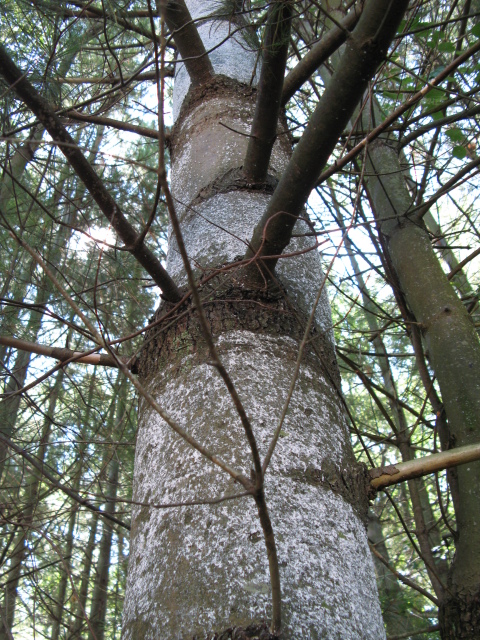Question
 White Pine Disease
White Pine Disease
I have several pines that have developed an apparent disease that has covered most of the trunk with a white substance. I request your expert advice on diagnosing and treating the problem. I attached two shots --- one from a distance and the other a close-up. I wonder if the problem could be related to the excessively high temperatures we've experienced on Long Island for the last 4 weeks. Thank you for your help.
AnswerIt looks like bark lice Archipsocus nomas, the webbing bark louse.
Bark lice are small, brown insects that live on the rough bark of hardwood trees, especially live oak trees. Contrary to their name, bark lice are not parasitic on humans or animals, rather they live on the bark of trees, feeding on fungi, lichens and dead insects. They serve as "clean-up" crew of sorts for the tree. They do not eat leaves or bore into the tree, or consume the bark of the tree. Because they are small and vulnerable, bark lice have developed a protective means for their survival: silken webs. Seemingly overnight, a colony of bark lice can envelop the trunk of a large tree with a silken covering. This silk covering affords bark lice the protection from predators while they feed underneath.
Treating bark lice is not necessary because they cause no harm. Some homeowners think they are unsightly and wish them to be gone. If treatment is absolutely desired, there are some options available. One option is soapy water. A concentration of 2 tablespoons of liquid dish soap per gallon of water will affect bark lice. Removing the webs with a stream of water by itself will not kill the bark lice, but it will stimulate them to rebuild the webs within a few hours. Insecticide sprays to the trunk will control these insects as well.
Here is a link to more information on bark lice. This is on oak but there is one on white pine also. Same critter. http://www.ag.auburn.edu/enpl/bulletins/barklice/barklice.htm






